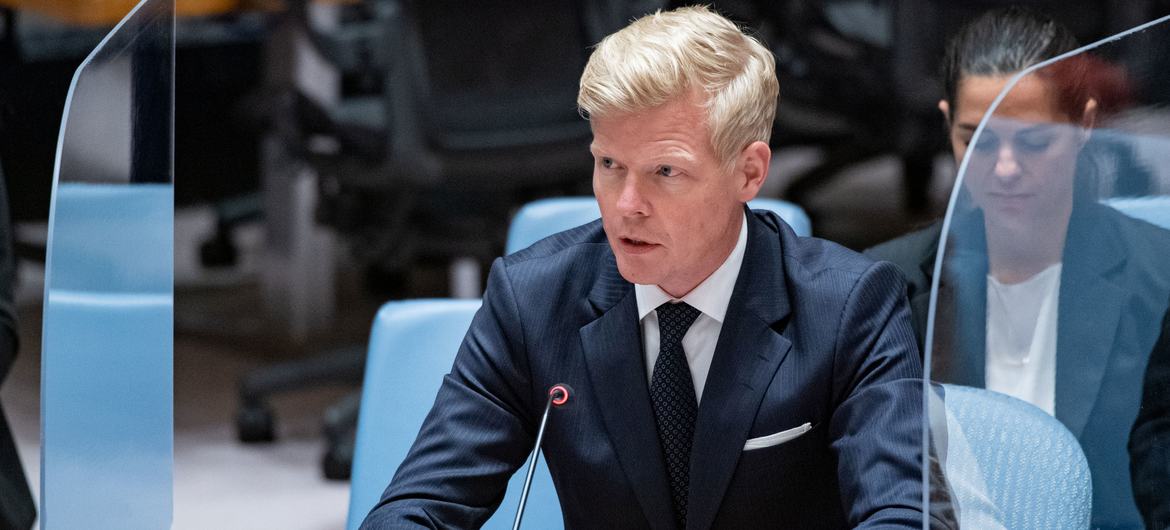In a briefing at the UN Security Council on 14 June, Special Envoy Hans Grundberg said the truce in Yemen continues to hold and contribute to a significant reduction in hostilities and civilian casualties across the country. To recall, the truce was initially agreed upon in April for a two-month period but was successfully extended on 1 June for another two months. Painting a realistic but cautiously optimistic picture of recent events in the country, Grundberg commended the warring parties for observing the truce that has now been in effect for two and half months – an unprecedented development described by the envoy as “unimaginable” at the beginning of the year.
While acknowledging a lack of independent and non-partisan monitoring capabilities, Grundberg affirmed a continued absence of airstrikes and cross-border operations in the country yet noted reports and allegations on both sides regarding truce violations. This includes occasional reports of UAV strikes, indirect fire, and armed clashes, primarily recorded near the Ma’rib, Taiz, and Hodeidah provinces where tensions remain elevated. Civilian casualties directly related to the conflict also continued to decline amidst the general cessation of hostilities, however the envoy expressed concerns over a rise in casualties resulting from landmines and explosive remnants. This is in part attributable to residents, including children, in war-torn areas now venturing into locations previously deemed inaccessible.
Moreover, Grundberg noted with optimism the resumption of commercial flights from Sana’a International Airport, with eight round-trip flights completed to Cairo and Amman. The provision of fuel to the port of Hodeidah has also been maintained, with the UN recording a larger import of fuel in April and May than during the previous year. That said, humanitarian conditions remain severe, and are hampered by the continuing siege of the city of Taiz and the increase in food and commodity prices. Grundberg also noted significant challenges ahead in terms of resolving pressing humanitarian, economic, and security needs, and that the truce has also brought to the fore a number of contentious issues that remain to be resolved to achieve a durable political settlement.
Truce remains significant accomplishment despite violations and key challenges
Despite its limitations and fragility, the truce achieved in April remains a significant diplomatic achievement for the UN and the new envoy who assumed the position earlier this year. To recall, the April truce was preceded by months of escalation marked by the most intense airstrike activity observed in the country since the start of the conflict and long-range Houthi UAV strikes against strategic assets on the Saudi mainland and the UAE. Since April however, an overall reduction in significant hostilities has been credibly documented, with an absence of Saudi airstrikes and Houthi cross-border operations confirmed by both sides.
That said, limited operations continue, and ceasefire violations are documented on a near-weekly basis. On 23 May, the Houthi Movement notably downed a Saudi-reconnaissance UAV in the Haddah district of Sana’a. The UAV impacted a civilian residential area, killing three civilians after being targeted by improvised surface-to-air missiles. For their part, the Houthi Movement is accused of employing UAVs and indirect fire to strike Yemeni government targets near Marib, including an incident this week when a member of the government-backed forces was reportedly killed in the city. Occasional clashes have also been recorded along the frontlines outside Marib, including a significant exchange of gunfire on 9 May resulting in the death of ten government soldiers and an unspecified number of Houthi casualties. Clashes have likewise been reported between Houthi Movement and factions affiliated with the UAE-backed Southern Transitional Council in al-Dhalea province, however these remain largely limited in scope and have not threatened the wider truce.
These developments understandably underline the fragility of the existing truce, however, the extension on 2 June and the general cessation of wider hostilities remains a positive indicator. Cautious optimism remains in effect that the truce will continue to allow time for dialogue and full implementation of the agreement, starting with the reopening of roads near Taiz, which may pave the way for a permanent ceasefire and political settlement.
The prospects for a permanent solution still remain remote, and there are no current indications that the negotiations undertaken in recent months have resolved the underlying issues. Related concerns remain that both sides – notably the Houthi Movement – view the truce primarily as an opportunity to reorganize and regroup before another offensive on Marib, following the territorial setbacks experienced earlier this year. The movement has yet to respond to the UN-led proposal to reopen roads around Taiz and remains reluctant to directly engage with the GCC-established Presidential Council in Aden.
For their part, a key challenge pertains to whether the newly formed council, which comprises an amalgamation of disparate representatives from the Saudi-backed government, the Southern Transitional Council and other factions, will achieve sufficient unity to engage in constructive dialogue with the Houthi Movement. Regardless, any progress achieved for the remainder of the truce will be highly revealing in terms of judging prospects for a more permanent settlement.


